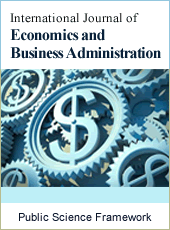International Journal of Economics and Business Administration
Articles Information
International Journal of Economics and Business Administration, Vol.5, No.2, Jun. 2019, Pub. Date: Jun. 24, 2019
Effects of Capital Market Development and Economic Growth in Nigeria from 1981-2018
Pages: 125-130 Views: 2002 Downloads: 432
[01]
Augustine Okon Jacob, Department of Management, School of Management Science, Heritage Polytechnic, Ikot Udota, Eket, Nigeria.
[02]
Okon Joseph Umoh, Department of Economics, University of Uyo, Uyo, Nigeria.
This research work examined the relationship between capital market development and economic growth in Nigeria. Time series data were collected from both secondary sources and econometric analysis of Ordinary Least Square (OLS). the data covered 1981 – 2018. The research sought to appraise the relationship of variables, such as market Capitalization (MCAP), Number of deals (ND), all share value index (ASI) and Inflation (INF) on economic growth of Nigeria. The result revealed has a positive correlation and conform to prior expectation and significantly influenced economic growth. Inflation revealed negative correlation and conformed to a priori expectation but was insignificant on the economic growth, which makes it not determinant in economic growth in Nigeria. Based on the findings of this research, conclusion was drawn and appropriate recommendations were made for the stakeholders in the capital market such as creation of awareness by government and organized private sector on the relevance and inherent benefit of investing in the capital market so as to boost the number of deals in the stock market operators.
Share Index, Economic Growth, Inflation, Investment
[01]
Abdulahi, S. A (2005). Capital market performance and economic development in Nigeria. An empirical analysis paper presented at the Dept. of Business Administration, Bayero University Kano.
[02]
Afees U. and Kazeem K. (2010) Intermediate Economic Analysis. Ibadan: Aromolara Publishing Company Limited.
[03]
Anyanwu, J. C. (1993). Monetary Economic Theory, Policy and Institutions. Uyo: Hybrid Publishers Limited.
[04]
Anyanwu, J. C., Oyefusi, S. A, Oaikhenan, H and Dimowa F. A (1997). Structure of the Nigeria Economy (1960 – 1997). Onitsha JOANEE Educational Publishers Ltd. Allie.
[05]
Jhingan M. L. (2004). Monetary economics, Vrinda Publication Ltd. Mayur Vihhar, Phase-I, Delhi. India
[06]
Caldron K and Liu I (2002). Capital market. Prentice Hall Inc. New Jersey.
[07]
Bensvenga V. R., Patrick, N., and Wei, P (1996). Money and capital market, USA McGraw Hill Higher Education.
[08]
Akinbohungbe, U. (1996) Capital Market and institutions. Prentice Hall Inc., Eglewood Cliffs, New Jersey.
[09]
Alile, H. I & Richard, A. Anao (1990). The Nigerian Stock Exchange in Operation, Lagos: Academy Press.
[10]
Al-faki, M. (2007). Best Investment Practices and Regulatory Compliance, Nigeria Security and Exchange Commission. Abuja: Green Press.
[11]
Agarwal, I. (2001) Money Banking and Finance Theory and practice. Lagos: intercontinental publishing.
[12]
Anyawu J. C (1998). Stock Market Development and Nigeria Economic Growth, Nigeria Financial Review. 7 (20), pp 6-13.
[13]
Ariyo L and Adelegan O. (2005). The role of operator in security market development in Nigeria. The Nigeria Experience. The Bullion. Vol. 16 No. 4.
[14]
Bolbo O., and Ariyo L. (2205). Intermediate economic analysis. Oyo. E. J Publishing Company Limited, Ibadan.
[15]
Adamu, J. A and Sanni, I (2005). Stock market development and Nigeria economic growth. Journal of Economics and Allied fields 2 (2), 116-132.

ISSN Print: 2381-7356
ISSN Online: 2381-7364
Current Issue:
Vol. 7, Issue 4, December Submit a Manuscript Join Editorial Board Join Reviewer Team
ISSN Online: 2381-7364
Current Issue:
Vol. 7, Issue 4, December Submit a Manuscript Join Editorial Board Join Reviewer Team
| About This Journal |
| All Issues |
| Open Access |
| Indexing |
| Payment Information |
| Author Guidelines |
| Review Process |
| Publication Ethics |
| Editorial Board |
| Peer Reviewers |


